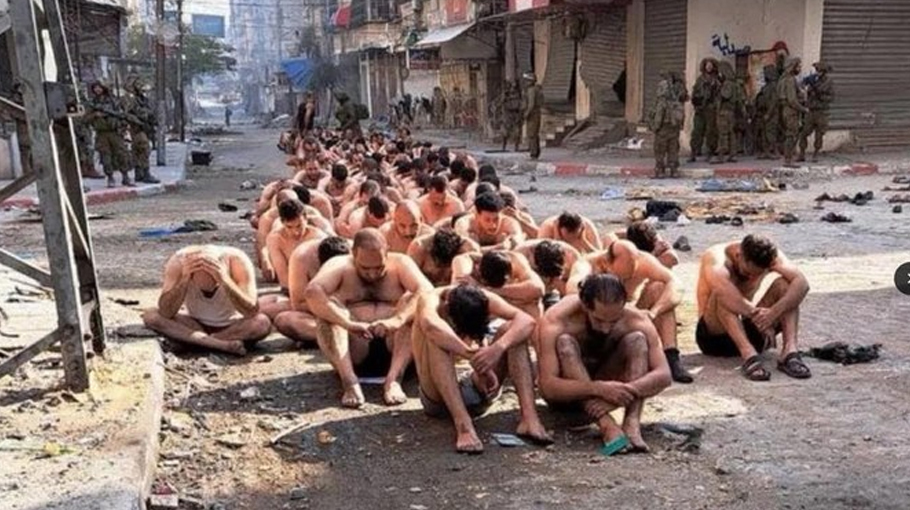Israel’s latest weapon against Palestinians-humiliation-will backfire

A video has gone viral showing an Israeli soldier in full protective gear standing in a small bookstore and gift shop somewhere in Gaza. Looking into the camera, most likely held by one of his comrades-in-arms, the soldier acts like a salesperson, offering the price of a toy, a book, and other trinkets before throwing items violently on the ground to ensure that they are broken. The message behind the Israeli video is clear: We are the masters, and we can do whatever we please to you, Palestinians.
The video appeared 24 hours after other, much more disturbing photos and videos of a large number of Palestinian men from Beit Lahia being transported in Israeli trucks and squatting with their hands behind their backs. The men are naked, except for their lower underwear. Israeli soldiers are seen standing by doing nothing. A moving video from a vehicle shows the khaki jacket of an Israeli soldier. The photos and videos were distributed in Israel and on social media.
These videos and their content have no military value to Israelis. Neither the small stationery/gift shop nor the squatting men appear to have any role in the Hamas-Israel war. Within a short time of the video of the partially clothed men going viral, Gazans were able to identify many of those shown. They happen to be professionals — engineers, doctors, journalists, and teachers, according to the people who were able to identify them. It turned out that the Israeli army took the men from their homes and from a UN school sheltering homeless people, made them strip, and forced them to squat or be transported.
When questioned, Israeli spokespersons claimed that those arrested were suspected Hamas members who had ignored Israel’s orders to resettle in the south of Gaza. The Israeli army, which was clearly in command of the area, claimed it had nothing to do with the distribution of images showing barely clothed Palestinians forced to squat in the dirt amid the December cold because they were suspected of having suicide belts.
Arab media reported that after a while the men were allowed to return to their families and the locations from which they were taken.
Clearly, they were not Hamas combatants. Social media was full of commentary saying that not a single Hamas fighter has surrendered or been captured alive. Furthermore, many commented that Israel, which has not discriminated much between civilians and combatants, would unlikely spare Hamas operatives.
So, what was the purpose of this Israeli army charade? The Israeli military has yet to achieve any of its declared goals.
The Israeli military has yet to achieve any of its declared goals. It has not destroyed Hamas nor has it succeeded in securing the release of a single hostage against the will of Hamas, which welcomed the exchange with Palestinian prisoners.
So, was this an attempt at achieving a cheap victory of sorts? Was the goal to relay to an angry Israeli public that the army is in command, and is controlling Palestinian areas and arresting Palestinians?
That might be one purpose, but another more sinister motive behind the Israeli army action was to humiliate Palestinians. Israel believes that Hamas humiliated its army and intelligence services, as well as civilians, on Oct. 7, and wants revenge. The army is not satisfied with the death of nearly 20,000 Palestinians in Gaza, more than half of whom were
children.
It seems oblivious to the destruction of schools, bakeries, mosques, hospitals, clinics, churches, universities, and ordinary homes. It wants something more cold hearted that will satisfy the Israeli desire to hit back hard at Palestinians for daring to challenge them and their mighty army/intelligence machine.
Stripping and humiliating Palestinian men is not new. During the intifada, this scene was repeated, as Israeli soldiers entered homes and ordered men out, forcing them to clean the streets of rubble, repaint graffiti, and sit for hours in the same way that the men from Beit Lahia were humiliated. In the years since the Oslo Accords, Israeli soldiers have generally stayed out of populated urban areas, especially in Gaza, and troops have been unable to do such things to Palestinians. Now they had their chance, and wanted to carry out and capture in photo and video such scenes of humiliation.
When UN Secretary-General Antonio Guterres said that Oct. 7 did not happen in a vacuum, he was referring to the years of Israeli occupation, subjugation, and efforts to humiliate Palestinians at checkpoints, during break-ins, and by taking their land and dignity.
But humiliation has its limitations, and is certainly counterproductive. While the Israeli public might get their kicks out of seeing Palestinian men humiliated or a soldier destroying a Palestinian toy store, people around the world have the opposite reaction. And for Palestinian families of those men, and the owners of that tiny store, such humiliating Israeli actions plant only anger, hatred, and, eventually, desire for revenge.
Daoud Kuttab, an award-winning Palestinian journalist, is the director of Community
Media Network.
Source: Arab News




